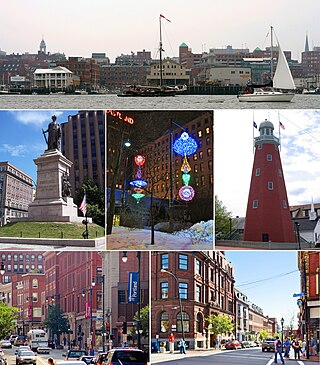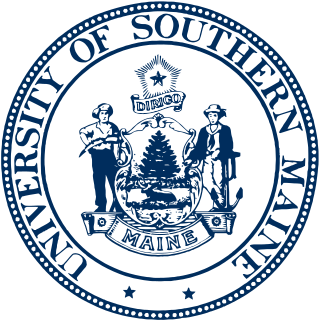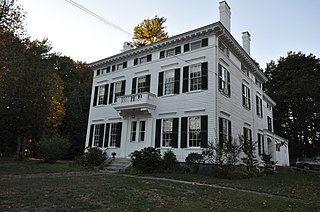
Portland is a port city and the most populous city in the U.S. state of Maine and the seat of Cumberland County. Portland's population was 68,408 in April 2020. The Greater Portland metropolitan area is home to over half a million people, the 104th-largest metropolitan area in the United States. Portland's economy relies mostly on the service sector and tourism. The Old Port is known for its nightlife and 19th-century architecture. The marine industry plays an important role in the city's economy, with an active waterfront that supports fishing and commercial shipping. The Port of Portland is the second-largest tonnage seaport in New England.

The University of Southern Maine (USM) is a public university with campuses in Portland, Gorham and Lewiston in the U.S. state of Maine. It is the southernmost of the University of Maine System. It was founded as two separate state universities, Gorham Normal School and Portland University. The two universities, later known as Gorham State College and the University of Maine at Portland, were combined in 1970 to help streamline the public university system in Maine and eventually expanded by adding the Lewiston campus in 1988.

The Phoenix was the name of several alternative weekly periodicals published in the United States of America by Phoenix Media/Communications Group of Boston, Massachusetts, including the Portland Phoenix and the now-defunct Boston Phoenix, Providence Phoenix and Worcester Phoenix. These publications emphasized local arts and entertainment coverage as well as lifestyle and political coverage. The Portland Phoenix, which was published until 2023, is now owned by another company, New Portland Publishing.

The Portland Rum Riot, also called the Maine Law Riot, was a brief but violent period of civil unrest that occurred in Portland, Maine on June 2, 1855, in response to the Maine law which prohibited the sale and manufacture of alcohol in the state from 1851.

Deering High School (DHS) is a public high school in Portland, Maine, United States. The school is part of the Portland Public Schools district.

The Portland Press Herald is a daily newspaper based in South Portland, Maine with a statewide readership. The Press Herald mainly serves southern Maine and is focused on the greater metropolitan area of Portland.

The Diocese of Portland is an ecclesiastical territory, or diocese, of the Catholic Church for the entire state of Maine in the United States. it is a suffragan diocese of the metropolitan Archdiocese of Boston.

The Portland Montreal Pipeline is a series of underground crude oil pipelines connecting South Portland, Maine, in the United States with Montreal, Quebec, in Canada. As of early 2016, the pipeline transports limited volumes, sufficient to keep the pipeline wet. The pipeline also supplied crude to the Suncor Montreal-Est refinery during supply interruptions due to the 2016 Fort McMurray wildfires.
Kennedy Park is a neighborhood in East Bayside in downtown Portland, Maine, built around a park, athletic fields, basketball courts, a playground and the Boyd Street Urban Garden.

The History of Portland, Maine begins when the area was called Machigonne, meaning "great neck," by Algonquians who originally inhabited the peninsula. It extends to the city's recent cultural and economic renaissance.

The Greater Portland METRO is a regional public transportation system, established in 1966, in Southern Maine. Operated by the Greater Portland Transit District, a transit district comprising Portland, Westbrook, Falmouth, Yarmouth, Freeport, and Brunswick, the system also covers Gorham and The Maine Mall portion of South Portland.
Portland, Maine, is home to many neighborhoods.

Franklin Street is a four-lane street in Portland, Maine, with a controversial history. It is a major corridor for traffic from Interstate 295 to Portland's downtown, Old Port, and to other neighborhoods located on the Portland peninsula.

The Captain Reuben Merrill House is an historic house at 233 West Main Street in Yarmouth, Maine. Built in 1858, it is one of the town's largest and most elaborate 19th-century houses, and is one of three known surviving works of Portland architect Thomas J. Sparrow. It was placed on the National Register of Historic Places in 1974. It is now home to Maine Preservation, a statewide architectural preservation organization.
Avery Yale Kamila is an American journalist, vegan columnist and community organizer in the state of Maine.
Thomas J. Sparrow was a prominent American architect active in the first half of the 19th century. Only three of his designs are known to be extant, with two of them now being listed on the National Register of Historic Places.
Andrew Jackson Cash was an American merchant for whom Cash Corner, in today's South Portland, Maine, is now named.
George Washington Cash was an American merchant for whom Cash Corner, in today's South Portland, Maine, is now named.













